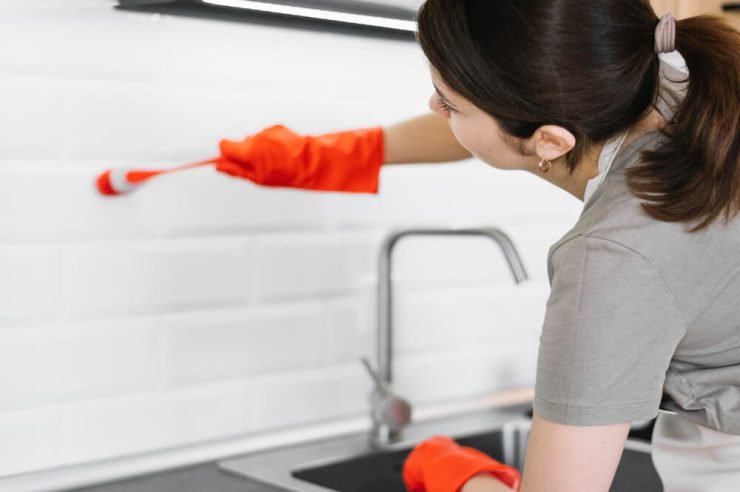However, it can become a hotspot for unwanted microbes and foul odors without proper cleaning. So, how should the kitchen sink be cleaned? This article will explore tips and tricks to keep your sink sparkling clean and hygienic.
What You’ll Need: Material & Tools
To properly clean your kitchen sink, you’ll need a few items, including:
- Soft sponge.
- Microfiber towel.
- Dish rag.
- A bottle of dish soap.
- A bottle of powder cleanser.
- A box of baking soda.
- Cups of white vinegar.
How to Clean a Kitchen Sink
Here are some helpful hints for cleaning a kitchen sink:
Clear the Sink of Any Debris
You must remove all garbage and food leftovers from your sink before starting the cleaning process. Using a brush or paper towel to remove larger pieces of leftover food will allow you to dispose of them in the rubbish properly afterward.
Rinse the Sink with Hot Water
After removing the debris, rinse the sink with hot water to soften any dirt or grime present in the sink. It will assist in loosening the dirt and make it simpler to clean if you run the hot water for a few minutes.
Apply a Cleaning Solution
To clean your kitchen sink effectively, there are different cleaning solutions that you can use. You can purchase a ready-made cleaner or create a solution using readily available household items like baking soda and vinegar.
To ensure the correct utilization of cleaners purchased at the shop, it is crucial to read and adhere to the label’s instructions carefully. Alternatives include sprinkling baking soda over the sink and spritzing it with vinegar or mixing equal amount of vinegar and water in a spray bottle.
Give the cleaning solution time to settle on the sink’s surface after applying it to ensure that dirt and grime are effectively removed. This will ensure the cleaning solution works as intended, leaving your kitchen sink sparkling clean.
Scrub the Sink
After applying the cleaning solution, use a scrub brush or a sponge to scrub the sink thoroughly. Pay keen attention to the corners and edges of the sink, as these areas accumulate dirt and grime.
Scrub the sink for at least two minutes to eliminate all the gunk. After thoroughly cleaning the sink, rinse it with hot water to remove leftover dirt and debris. Then wipe the sink dry.
Disinfect the Sink
To clean the sink, use some water with some bleach. One gallon of water and one tablespoon of bleach should be added to a bucket. Then the solution should be poured into the sink.
Allow the solution to rest in the sink for a several minutes to disinfect it thoroughly. Afterward, rinse it with hot water to remove any remaining bleach solution. Then wipe the sink dry using a clean sponge or cloth.
Polish the Sink
To give your sink an attractive shine, use a small amount of mineral or olive oil to polish it. Using a clean towel, apply the oil to the sink’s surface, then buff the sink to remove any extra oil. This will help to achieve a sparkling and glossy finish.

Tips to Keep Your Kitchen Sink Clean For a Long Time
The following tips will help you keep your kitchen sink spotless for a long time:
- Rinse it after use: Rinsing your kitchen sink well after each use is the simplest method to keep it clean. This will assist in clearing away any collected food particles or liquids, halting the formation of bacteria and lowering the possibility of smells.
- Clean it regularly: Regular cleaning is essential to keep your sink looking and smelling fresh. Avoid harsh chemicals or abrasive scrubbers that could damage the sink’s surface.
- Don’t leave dishes in the sink: Dirty dishes can cause odors and stains by allowing food particles and bacteria to build up. Instead, dishes should be washed and stored as quickly as possible.
- Use a drain strainer: A drain strainer is a simple and least expensive solution to stop food scraps, hair, and other material from blocking your sink drain. Be sure to empty the strainer regularly and dispose of any debris in the trash.
- Don’t pour grease or oil down the drain: Grease and oil can solidify your pipes, causing clogs and unpleasant odors. Instead, collect them in a container and throw them away.
- Address any leaks promptly: A small leak in your sink or faucet can lead to water damage and mold growth. If you notice any leaks, have them repaired as soon as possible to avoid more significant problems.
Conclusion
A clean kitchen sink is necessary for a healthy and sanitary household, and it’s simple to attain with a little work. Using these basic cleaning and maintenance methods, you can keep your sink gleaming, clean, and free of dangerous germs and bacteria. So put on your work boots, get your cleaning tools, and pay your kitchen sink the respect it deserves!
Frequently Asked Questions
Cleaning your kitchen sink is advised at least once a week or more frequently if used. To avoid the accumulation of food debris and stains, it is crucial to rinse and clean the sink after each usage.
Hard water stains can be removed using a solution of vinegar and water or a commercial descaler. After applying the solution and allowing it to sit briefly, clean the sink gently with a brush or sponge.
Use a sink strainer to catch food particles and debris to prevent your kitchen sink from clogging. Avoid pouring oil or grease down the sink, as it can solidify and cause blockages. Additionally, run hot water down the sink after each use to help flush out any buildup.










